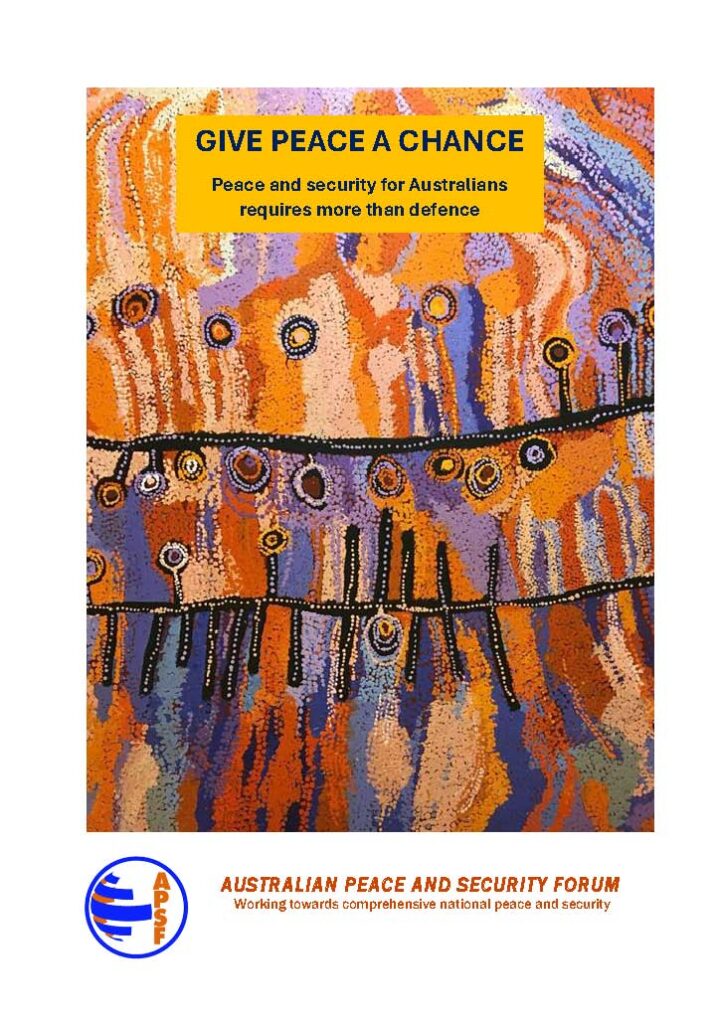Australian peace and security group joins call for review of AUKUS
A national network of prominent Australians with expertise in a wide variety of fields, today joined calls for the next Australian government to review the AUKUS submarine agreement with the US and UK governments through full and transparent public and parliamentary consultation. The Australian Peace and Security Forum (APSF) made the call in its first Quarterly Report, Give Peace a Chance, released today.
At $368 billion AUKUS is by far Australia’s most expensive and risky defence purchase according to Major General (ret’d) Michael G Smith AO. He argues that AUKUS jeopardises Australia’s peace and security by further embedding the Australian Defence Force (ADF) into the US war machine against China, our major trading partner. “AUKUS bases and US and ‘joint’ military facilities in Australia will be directly targeted should a war with China eventuate, resulting in significant civilian collateral damage,” explains Smith.
Smith considers that there is “no guarantee that Australia will be able to procure its eight nuclear-powered submarines on time and on budget, and most likely not at all.” The AUKUS program, he says, “unbalances the ADF”, highlighting that “our Navy surface fleet and our Army are already being required to pay a heavy price for AUKUS”.
In the APSF Quarterly Report, Give Peace a Chance, a range of well-informed specialists/researchers examine six key issues at the heart of peace and security for all Australians. The issues include China-Australia relations, nuclear disarmament, AI weapons, and conflict prevention.
China threat?
There can be little doubt that AUKUS was predicated on the unsubstantiated assertion that China threatens Australia’s territorial sovereignty and vital interests. In the second paper in the Report, Dr Vince Scappatura points out that “China’s military spending as a percentage of GDP has remained fairly flat, and to this day is still less than India or Vietnam or even Australia, and certainly much less than that of the United States.”
Yet the Australian government and the national security establishment has opted in no uncertain terms to characterise China’s rise as a serious security threat to Australia.
“If China’s nuclear arsenal is targeting Australia primarily because we are becoming increasingly implicated in America’s nuclear warfighting plans, including forward-basing US nuclear-capable bombers on Australian territory, is it China or the United States that threatens our security?” he asks.
Scappatura concludes that “until and unless Australia disabuses itself of the ‘China threat’ discourse the possibilities for diplomacy will continue to be severely circumscribed.”
Give Peace a Chance is available for free download here.
Contact: Mike Smith 0439 490 297 Vince Scappatura 0422 837 002
Email: info@austpeaceandsecurityforum.org.au Website: https://austpeaceandsecurityforum.org.au

Articles and Contributors
1. AUKUS jeopardises Australia’s Peace and Security 1
Michael G Smith (Major General (ret’d))
2. Does China threaten Australia’s future peace and security? 7
Vince Scappatura (Macquarie University)
3. International Law and the Rules Based Order in the Trump Era
– the Challenge for Australia 13
Matthew Neuhaus (Professor International Law ANU)
4. Australia can again become a champion of nuclear disarmament 16
Melissa Parke (Executive Director, International Campaign for
Abolition of Nuclear Weapons)
5. Artificial Intelligence and War: limits to protect humanity 20
Matilda Byrne (Coordinator, Australia Stop Killer Robots Campaign)
6. If we want peace, we need to prevent conflict 25
John Langmore, (Chair Initiative for Peacebuilding, Univ of Melbourne)
Adrian Morrice (former researcher UN the Departments of Peacekeeping
and Political Affairs, NY) and Russell Rollason (former Diplomat)
